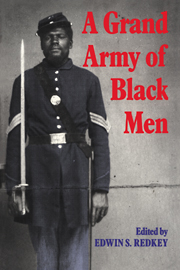Book contents
- Frontmatter
- Contents
- Preface
- Acknowledgments
- List of Abbreviations
- Introduction: For Freedom and Equality
- 1 Black Soldiers in White Regiments
- 2 South Carolina, Georgia, and Florida
- 3 Virginia and North Carolina
- 4 The Gulf States
- 5 Occupation Duty
- 6 For the Rights of Citizens
- 7 The Struggle for Equal Pay
- 8 Racism in the Army
- 9 The Navy
- 10 War's End
- Index
- Cambridge Cultural Social Studies
8 - Racism in the Army
Published online by Cambridge University Press: 24 March 2010
- Frontmatter
- Contents
- Preface
- Acknowledgments
- List of Abbreviations
- Introduction: For Freedom and Equality
- 1 Black Soldiers in White Regiments
- 2 South Carolina, Georgia, and Florida
- 3 Virginia and North Carolina
- 4 The Gulf States
- 5 Occupation Duty
- 6 For the Rights of Citizens
- 7 The Struggle for Equal Pay
- 8 Racism in the Army
- 9 The Navy
- 10 War's End
- Index
- Cambridge Cultural Social Studies
Summary
LIEUTENANT ROBERT H. ISABELLE resigned as one of the black officers of the Second Louisiana Native Guards. With other free black men from New Orleans, he had volunteered to serve the Union soon after Federal troops took that city in 1862. He had been elected an officer by the men, many of whom were well educated, some of whom were wealthy, some of whom had served in the War of 1812. His was one of the only three black regiments to be led by men of color. But Lieutenant Isabelle resigned, and the other black officers soon followed. The reason was racism: “I joined the United States Army … with the sole object of laboring for the good of our Country,” he wrote, “but after five or six months experience I am convinced that the same prejudice still exist[s] and prevents that cordial harmony among officers which is indispensable for the success of the army.” Racism drove him out of the service.
Racism pervaded the United States, North and South. In the Southern states it went hand in hand with economics to support slavery. It gave slaveowners a convenient reason for keeping their laborers in permanent bondage. Other whites, no matter how poor, liked to think that all blacks, slave or free, were less worthy than any whites. In the North most whites felt the same way about blacks: Even some abolitionists, who wanted a quick end to slavery, believed blacks were not as good as whites. Restrictions, insults, and unfair treatment plagued the everyday lives of African Americans.
- Type
- Chapter
- Information
- A Grand Army of Black MenLetters from African-American Soldiers in the Union Army 1861–1865, pp. 249 - 268Publisher: Cambridge University PressPrint publication year: 1992

